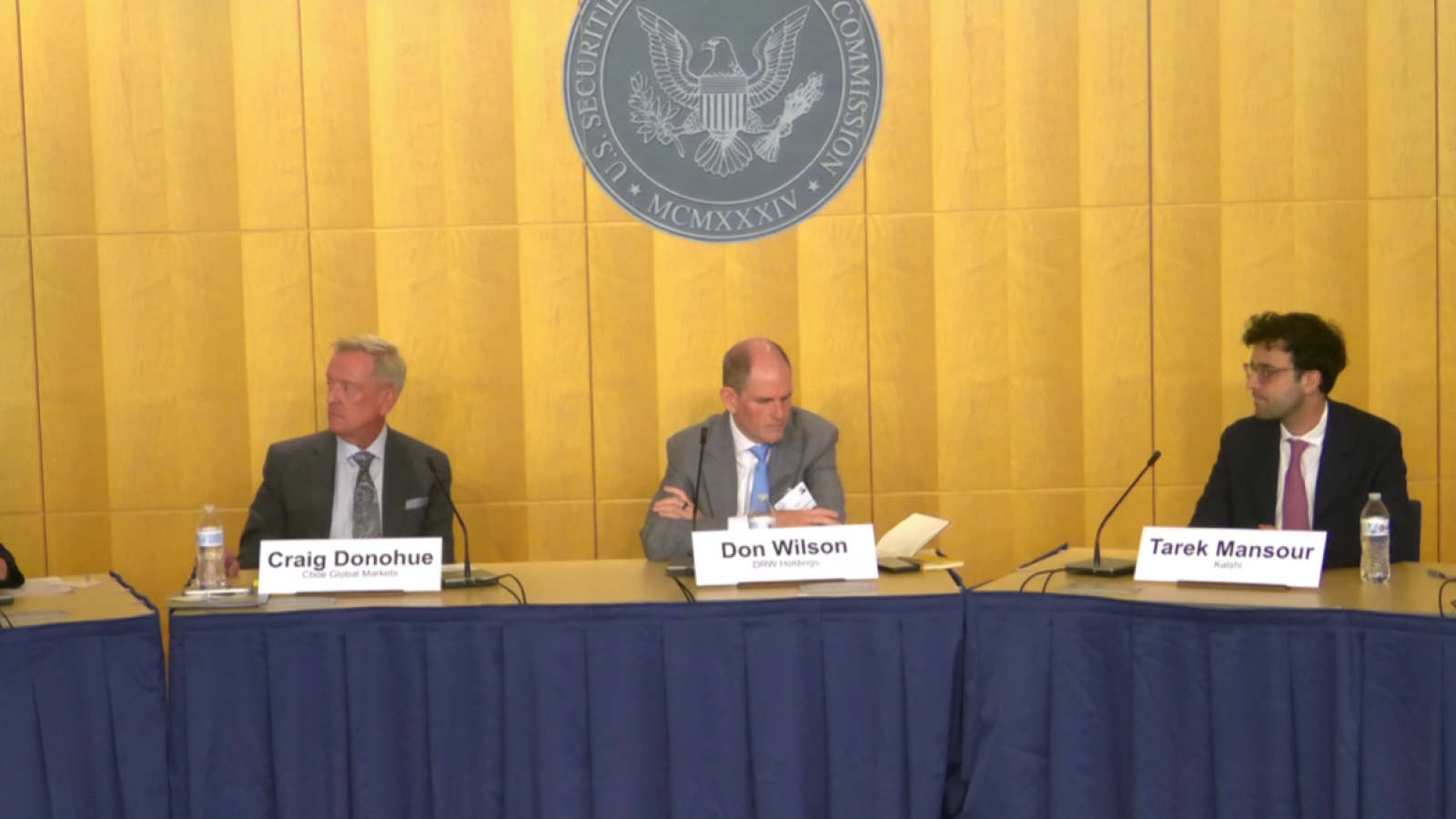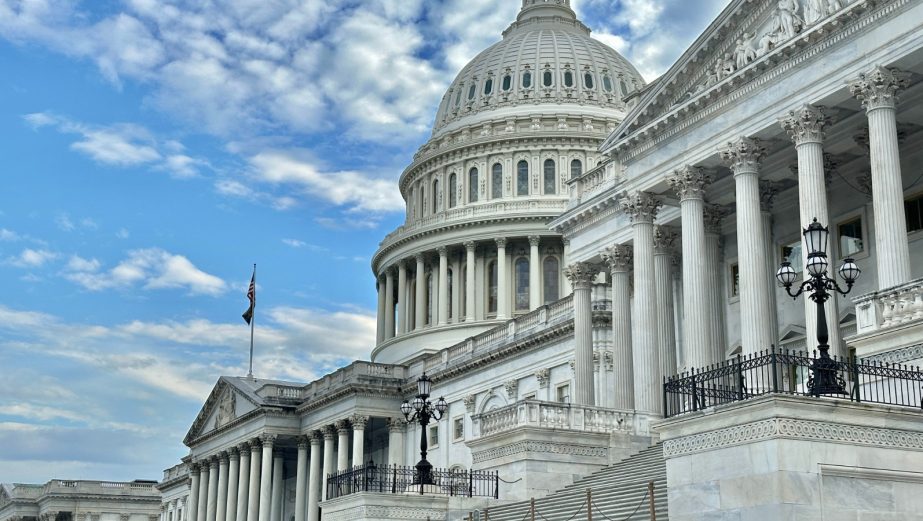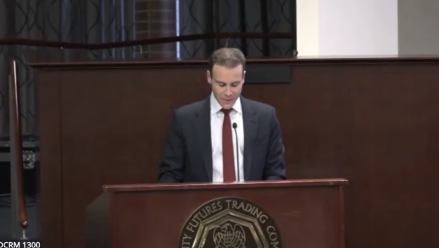A hotly anticipated panel featuring the CEOs and founders of prediction markets Kalshi and Polymarket featured no real discussion of sports event contracts, but may have been a signal of the newfound legitimacy of both platforms within the financial ecosystem.
Both Kalshi co-founder Tarek Mansour and Polymarket founder Shayne Coplan spoke on a panel about the platforms, as part of a joint roundtable held by the Securities and Exchange Commission (SEC) and the Commodity Futures Trading Commission (CFTC) Monday on regulatory “harmonization.”
Despite featuring the chief executives of both Kalshi and Polymarket, the panel on “how regulatory harmonization efforts could unlock economic value for platforms while continuing to protect investors,” had no direct discussion of sports event contracts.
The largest takeaway from the panel may have simply been the presence of the two prediction market founders as representatives of the “new guard” — alongside Arjun Sethi, the co-CEO of crypto exchange Kraken — in a panel that spent little time on the specifics of their products or directly questioned their legitimacy. That may show that futures and securities regulators have few concerns about whether any of their contracts are, or should be, unlawful.
Both Mansour and Coplan noted that their presence on the panel was itself a statement about how regulators’ stances towards their products had changed.
“It is really inspiring to see how far we’ve come in having regulators willing to have us here,” Mansour said.
Coplan joked about being “whisked away” by authorities, having had his home raided last year as part of a Department of Justice probe that was dropped in July.
Craig Donohue of Cboe Global Markets joked, “They had to endure FBI raids and Wells notices, but they also had to wear ties today, which is equally oppressive for them.”
Should innovators get exemptions?
Much of the panel dealt with the issue of innovation, and how to allow companies room to innovate in a way that is fair and beneficial for market participants.
Terrence Duffy, chief executive of commodities giant the CME Group, discussed the idea of an “innovation exemption,” an idea put forward by the SEC that would allow for greater freedom for exchanges to launch new products. He said he was concerned that some of these new products were merely a repackaging of an existing product that might have greater restrictions.
“You cannot have a double standard,” Duffy said. “It has to be a single standard.
“When you talk about a lot of these innovation exemptions, a lot of them are the exact same products being traded today under a different name, under a different regulatory regime.
“If you want to talk about harmonization, you can’t have this innovation exemption and then exclude the incumbents.”
Those comments may have relevance to sports event contracts, which the betting industry, gambling regulators, and tribes have largely seen as sports betting under a new name.
Duffy’s business announced a partnership with FanDuel last month that would allow the sports betting giant to enter the world of prediction markets by offering access to contracts created by CME. The partnership will — at least at first — focus on event contracts related to economic or financial indicators like interest rates or the S&P 500, rather than including sports event contracts.
Though Duffy perhaps came the closest to challenging the two prediction market bosses on the panel, he also expressed an appreciation for Kalshi’s product.
“I was on Tarek’s market all weekend like a junkie,” he said, adding that Mansour “made money” while he “broke even.”
Coplan: Don’t push innovation offshore
Coplan, whose platform does not yet accept U.S. customers, said that while he wasn’t looking for “blanket approval,” rules should be flexible enough to prevent major platforms from operating offshore.
“I’m not here advocating for, ‘Hey, give us a free pass to compete in a way that the CME cannot,’ but if you want young entrepreneurs to compete and build products that can be competitive on a global scale, it’s net negative to go and – from a regulatory perspective – drive that offshore,” he said.
“I’m not saying go and do whatever. It’s going to take players like Polymarket and other players in decentralized finance to go and be thoughtful about what we can comply with and what might need work.
“I’m not asking for blanket approval, but when there’s new technological innovation, the American way is to embrace that, not to wait years for that to play out.”
He added that Polymarket was able to grow scale offshore, which allowed it to then build out its general rules and regulatory arm.
Mansour did not advocate strongly for an innovation exemption. His business has worked within the CFTC-regulated environment, or challenged the regulator in court, rather than operating offshore.
“I don’t feel strongly about a need for exemption versus not,” he said. “What I do feel strongly about is a level playing field.
“We as a company have had level playing fields at times, and then have not in other ways.”
While it likely has a level playing field with other CFTC-registered firms, sports betting operators have argued that they do not compete on a level playing field with Kalshi. The exchange allows customers to stake money on the outcomes of sporting events in all 50 states – including ones that have not legalized sports betting – and is not subject to gambling taxes or sports betting regulations even in states with legal sportsbooks because it is federally regulated.
Donald Trump Jr., who has advisory roles with both Kalshi and Polymarket, posted on social media site X on Saturday alluding to “changing” the idea that customers in states like Alabama and Georgia cannot legally bet on sports.
Polymarket still not available in US
Polymarket acquired a CFTC-registered designated contract market (DCM) named QCEX in July, which gave it a path to enter the U.S. market without needing to go through the years-long approval process.
However, it still must make changes from its global platform before it can launch. The business is widely expected to offer a separate U.S. exchange, walled off from the existing global operation, due to CFTC rules that would require it to perform know-your-customer checks on all participants on the exchange.
Coplan noted that the adjustment from Polymarket’s global site — which records all transactions on the Polygon blockchain platform — to something that would be compliant with the CFTC’s rules can be difficult.
“Once you build something on a blockchain it’s very hard to map that to the existing regulatory matrix,” he said.
Earlier this month, after receiving an exemption to a minor reporting rule, Coplan said that Polymarket had the “green light” to launch in the U.S. However, almost four weeks later it has still not done so.
At one point in the discussion Mansour alluded to the same reporting exemption in the context of his own business, describing the exemption as “kind of irrelevant.”
Last week, the CFTC certified new Polymarket rules, including a deposit incentive program.
Kalshi self-certifies thousands of markets
Mansour noted that his business had made liberal use of the CFTC’s self-certification process, which allows an exchange to inform the CFTC that it plans to list a new market. If the CFTC does not object, the market is treated as if it is allowed, though it is not technically “approved.”
Kalshi self-certified 647 new markets last year and 1,364 this year.
“We’re on course to list over 2,000,” he said. “We’re trying to push 3,000 but we’ll see.”
Among the markets self-certified by Kalshi this month is a type of bet that would allow users to build their own parlays. On Monday, the prediction market launched its first parlays of this kind, after introducing pre-built parlays before Week 1 of the NFL season.
When discussing self-certification himself, Duffy noted that self-certification “is not approval,” “and a lot of the people participating in the products do not understand that.”
“And if you want to grow these products you better understand that the participants understand this,” he said.
Mansour also noted that “security adjacent products and security futures have become the next frontier,” in the regulated prediction market space. That would refer to markets that are related to stock prices or publicly traded companies.
Earlier this month, Polymarket offered contracts on whether companies’ earnings would beat analysts’ expectations. The unusual settlement criteria of these markets led to controversy, as if a company didn’t report a particular kind of earnings – which they were not required to report – the market would automatically settle as “No,” no matter how well they performed in standardized measures.
SEC chair dismisses regulator merger talks
During the opening remarks to the roundtable, SEC Chair Paul Atkins alluded to the idea of bringing the CFTC under the control of the SEC, which he said was not the focus of the meeting.
“Our focus is on harmonization, not on a merger between the SEC and CFTC,” Atkins said.
Atkins is reportedly among the candidates being considered to chair the CFTC after Brian Quintenz’s nomination stalled. Some see the move as an effort to turn the CFTC into an arm of the SEC.
“For years, the SEC and CFTC have worked in silos, sometimes at odds. Now, we’re paving a unified path forward,” Atkins said.






